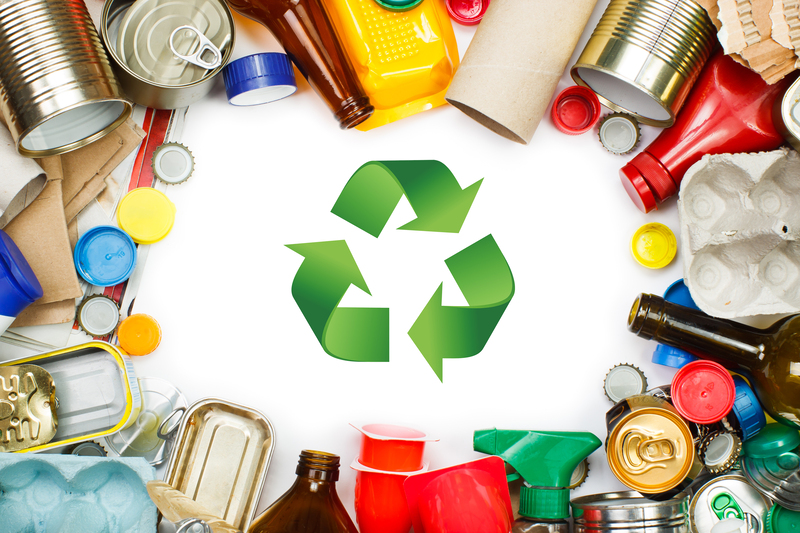Uncover The Best Tips For Effective Home Recycling
Saving the planet starts at home. Now more than ever, it's crucial to adopt sustainable habits that minimize waste and protect the environment. One of the most impactful habits is effective home recycling. Learning to recycle properly reduces pollution, conserves resources, and even saves money. If you're ready to revolutionize your household's sustainability, this guide will help you uncover the best tips for effective home recycling and make every effort count.

Why Is Home Recycling So Important?
Many people underestimate the power of recycling at home. When done properly, it:
- Reduces landfill waste
- Conserves natural resources
- Decreases pollution
- Supports the recycling industry
- Saves energy
Did you know? According to the EPA, recycling and composting prevented about 146 million tons of waste from ending up in landfills in just one year.
How to Start Simple Home Recycling
If you're new to recycling, begin with these foundational steps:
- Research local recycling rules: Every community has different requirements. Check with your local waste management or municipality.
- Set up recycling bins: Use separate, clearly labeled bins for different types of recyclables - typically plastics, paper, glass, and metals.
- Educate your family: Get everyone in the household involved and informed about what can and cannot be recycled.
Understanding What You Can and Cannot Recycle
One of the main challenges with home recycling is confusion around what's accepted. Different recycling programs accept different items. Here are some general guidelines:
- Papers and Cardboard: Newspapers, magazines, office paper, and cardboard (flatten boxes, remove liners).
- Plastics: Most programs accept plastics labeled #1 (PETE) and #2 (HDPE). Check the resin code on the bottom.
- Glass: Bottles and jars are commonly accepted, but items like ceramics and mirrors are not.
- Metals: Aluminum cans (drink cans), steel food cans. Rinse before recycling.
Avoid recycling: Plastic bags, greasy pizza boxes, polystyrene foam, and batteries, unless your local site accepts them.
Labeling and Sorting: Keys for Successful Household Recycling
- Use clear, readable labels: Mark bins with both words and images for paper, glass, plastic, etc.
- Keep bins together: Placing all bins in one spot makes it easier for everyone to participate.
- Rinse containers: Leftover food or liquids can contaminate recyclables and cause entire batches to be thrown away.
- Flatten boxes: This saves space in your bin and at processing centers.
Advanced Home Recycling Tips for Maximum Impact
Separate Compostables from Recyclables
Not all waste belongs in the recycling bin -- some, like food scraps and yard trimmings, are best composted. Set up a small kitchen bin for compostables:
- Fruit and vegetable peels
- Coffee grounds and filters
- Egg shells
- Garden cuttings
Composting not only reduces landfill waste, but also gives you nutrient-rich soil for plants.
Know Your E-Waste: Responsible Electronics Recycling
Electronic waste (e-waste) contains valuable materials but can also be hazardous. Items like old phones, batteries, and cables deserve special attention. Many communities have e-waste drop-off days or partner with retailers for convenient recycling. Never put e-waste in regular bins!
Creative Upcycling at Home
Upcycling transforms old or unused items into something new and useful, reducing the need to recycle at all. Ideas include:
- Turning glass jars into storage containers
- Using old t-shirts as cleaning rags
- Making plant pots from tin cans
This not only reduces waste but also adds a creative, personal touch to your home.
The Most Common Mistakes to Avoid in Home Recycling
Even with the best intentions, common errors can undermine your recycling effort. Steer clear of these:
- Wish-cycling: Putting non-accepted items in the recycling, hoping they'll somehow be recycled
- Not cleaning containers: Food residue can spoil whole recycling loads
- Recycling plastic bags curbside: Instead, return them to designated store drop-offs
- Leaving lids on bottles: Many programs ask you to remove and discard plastic lids, as they are often not recyclable
- Including hazardous materials: Things like batteries, paint, and chemicals should go to special facilities
Best Practices: How to Make Home Recycling Work for You
Stay Up to Date with Local Guidelines
Rules can change: Visit your city or waste management's website regularly for updates.
- Sign up for newsletters or notifications.
- Participate in community recycling events to learn more.
Invest In Reusable Alternatives
Reusable products cut down on single-use waste and simplify recycling. Consider:
- Cloth shopping bags (instead of disposable plastic)
- Water bottles and coffee cups made of glass or stainless steel
- Fabric napkins and towels
Encourage Kids and Roommates to Participate
Effective home recycling is a team effort.
- Make recycling bins accessible to all ages.
- Turn recycling chores into a fun game or challenge.
- Reward responsible recycling habits.
Innovative Solutions for High-Volume Households
Larger homes naturally generate more waste. To uncover the best tips for effective home recycling here, try:
- Designate a recycling zone: Choose an easily accessible area that everyone uses.
- Schedule regular recycling days: Put reminders on your calendar for weekly or bi-weekly recycling trips.
- Use stackable bins: Save space and simplify sorting for big families.
Buy in Bulk and Reduce Waste Upfront
Reducing what you buy in single-use packaging is hugely effective. Opt for bulk purchases and products with minimal packaging. Bring your own containers to stores where possible.
Home Recycling FAQs
What should I always avoid putting in my recycling?
- Plastic bags or film (unless specifically accepted)
- Greasy food containers or pizza boxes
- Styrofoam (EPS foam)
- Mirrors, ceramics, or glass cookware
- Hazardous waste (batteries, electronics, paint)
What if my city doesn't recycle certain items?
Many items can be taken to specialty drop-offs or recycling events. Local retailers often accept electronics, batteries, bulbs, and plastic bags.
How clean do my recyclables need to be?
Containers should be free of food and drink residue. A quick rinse is typically sufficient -- you don't need to scrub them spotless.
Upgrading Your Routine: Digital Tools for Recycling
Several mobile apps and websites can help streamline household recycling:
- Recycle Coach: Custom reminders and local rules
- iRecycle: Find recycling points for hard-to-recycle items
- Earth911: Useful articles and a recyclables locator

Sustainability Beyond Recycling: Reduce and Reuse
While effective home recycling is essential, the most sustainable approach is to reduce and reuse before recycling.
- Only buy what you need: Avoid impulse purchases and choose long-lasting products.
- Borrow or share items: Tools, books, and appliances can often be borrowed from friends or neighbors.
- Donate instead of discarding: Clothing, electronics, and furniture in good condition benefit charities and extend the life of items.
Conclusion: Make Your Recycling Count
Uncovering the best tips for effective home recycling is about more than just separating your bottles and cans. It requires education, diligence, and creativity to ensure your household's recycling is as impactful as possible. By knowing what to recycle, keeping bins organized and clean, involving your family, and using technology and upcycling, you can dramatically reduce your environmental footprint. Small actions made consistently add up to a huge difference for our planet.
Start today! Review your household's recycling habits, educate your family about local guidelines, and commit to new sustainable practices. Together, we can create a cleaner, greener world -- starting right at home.
Ready to Transform Your Home Recycling Routine?
Bookmark this guide and share it with friends and neighbors. For even more tips and updates on sustainable living, subscribe to eco-friendly newsletters or join community environmental groups. Doing your part makes a significant impact-- the time to start is now!